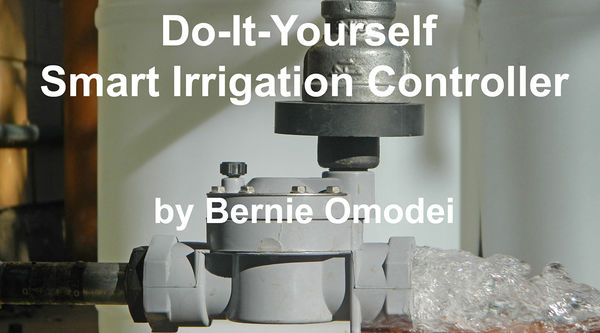Difference between revisions of "DIY Smart Irrigation Controller"
From energypedia
***** (***** | *****) m |
***** (***** | *****) m |
||
| Line 1: | Line 1: | ||
| − | |||
= Video = | = Video = | ||
[[File:DIY Smart Irrigation Controller.jpg|left|600px|alt=DIY Smart Irrigation Controller.jpg]]<div style="clear: both"></div> | [[File:DIY Smart Irrigation Controller.jpg|left|600px|alt=DIY Smart Irrigation Controller.jpg]]<div style="clear: both"></div> | ||
| Line 6: | Line 5: | ||
*[https://www.youtube.com/watch?v=EBFW2Vxo9fI&t https://www.youtube.com/watch?v=EBFW2Vxo9fI&t] DIY Smart Irrigation Controller YouTube video<br/> | *[https://www.youtube.com/watch?v=EBFW2Vxo9fI&t https://www.youtube.com/watch?v=EBFW2Vxo9fI&t] DIY Smart Irrigation Controller YouTube video<br/> | ||
| − | + | The video has Do-It-Yourself instructions for making an unpowered smart irrigation controller for any irrigation application. Because it is smart you save water. Because it is completely automatic you save time. Because it is a DIY project you save money. Because it is incredibly simple and low tech there are fewer things to do wrong. | |
= Key features = | = Key features = | ||
| − | + | When you have completed the project, the smart irrigation controller will have the following key features: | |
| − | |||
| − | |||
| − | |||
#Completely automatic | #Completely automatic | ||
#No electricity is needed (no batteries, no solar panels, no computers, and no electronics) | #No electricity is needed (no batteries, no solar panels, no computers, and no electronics) | ||
| Line 28: | Line 24: | ||
#The Do-It-Yourself project allows you can minimise the cost by using locally sourced components (it will be even cheaper if you can find suitable used components) | #The Do-It-Yourself project allows you can minimise the cost by using locally sourced components (it will be even cheaper if you can find suitable used components) | ||
#Use for any size irrigation application provided that the solenoid valve has a large enough flow rate. | #Use for any size irrigation application provided that the solenoid valve has a large enough flow rate. | ||
| − | |||
Complete documentation for the DIY Smart Irrigation Controller is contained in Chapter 3 of "Unpowered Measured Irrigation Training Manual for Smallholders" (download from the Measured Irrigation website: [https://www.measuredirrigation.com.au https://www.measuredirrigation.com.au]). | Complete documentation for the DIY Smart Irrigation Controller is contained in Chapter 3 of "Unpowered Measured Irrigation Training Manual for Smallholders" (download from the Measured Irrigation website: [https://www.measuredirrigation.com.au https://www.measuredirrigation.com.au]). | ||
| − | |||
| Line 41: | Line 35: | ||
*[[Portal:Powering Agriculture|Powering Agriculture Portal]] | *[[Portal:Powering Agriculture|Powering Agriculture Portal]] | ||
| + | [[Category:Irrigation]] | ||
[[Category:Powering_Agriculture]] | [[Category:Powering_Agriculture]] | ||
| − | |||
Revision as of 12:03, 26 February 2019
Video
- https://www.youtube.com/watch?v=EBFW2Vxo9fI&t DIY Smart Irrigation Controller YouTube video
The video has Do-It-Yourself instructions for making an unpowered smart irrigation controller for any irrigation application. Because it is smart you save water. Because it is completely automatic you save time. Because it is a DIY project you save money. Because it is incredibly simple and low tech there are fewer things to do wrong.
Key features
When you have completed the project, the smart irrigation controller will have the following key features:
- Completely automatic
- No electricity is needed (no batteries, no solar panels, no computers, and no electronics)
- Adjust the water usage by adjusting the control dripper
- Adjust the irrigation frequency by changing the evaporator
- Use for both gravity feed and pressurised irrigation
- The irrigation frequency and the water usage are directly proportional to the net evaporation rate (that is, evaporation minus rainfall
- Responds appropriately when there is an unexpected heat wave
- When it rains, water enters the evaporator and delays the start of the next irrigation
- Water usage is independent of the water supply pressure
- Uses much less water without affecting the yield
- It is incredibly simple and low tech and so there are fewer things to go wrong
- Provided you have a continuous water supply, you can leave your irrigation application unattended for weeks on end
- The Do-It-Yourself project allows you can minimise the cost by using locally sourced components (it will be even cheaper if you can find suitable used components)
- Use for any size irrigation application provided that the solenoid valve has a large enough flow rate.
Complete documentation for the DIY Smart Irrigation Controller is contained in Chapter 3 of "Unpowered Measured Irrigation Training Manual for Smallholders" (download from the Measured Irrigation website: https://www.measuredirrigation.com.au).




















